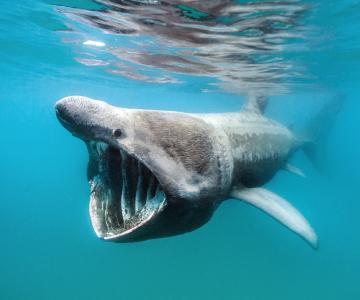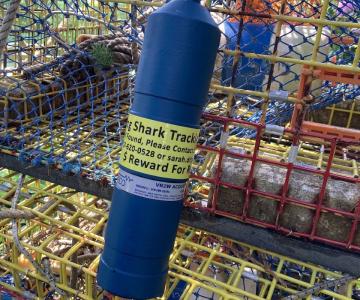As the U.S. offshore wind energy industry grows in the coming years (and decades), multiple Wind Energy Areas will be developed in waters across the U.S. Outer Continental Shelf, providing a significant amount of energy for Atlantic Coast states. However, associated offshore wind construction and maintenance activities could potentially impact the animals and fishermen who rely upon these habitats. Consequently, BOEM is partnering with commercial lobstermen on a study that will improve the bureau’s understanding of fish movements and help reduce offshore wind energy development impacts on basking sharks and other large marine species.
Scientists with BOEM and partner organizations are implanting acoustic transmitters, or tags, onto fish found in U.S. waters. The tags will transmit information on fish movement to small acoustic receivers when the tagged animals are within the receivers’ range. Currently, scientists have placed receivers in fixed positions in designated areas of interest. To increase the transmitter/receiver coverage area, scientists are mounting open-source GPS logging receivers to lobster traps. These traps would be an effective platform for this type of research because they are set and recovered regularly.
By partnering with commercial lobstermen, BOEM hopes to collect information beyond the geographic limitations of fixed receiver arrays, which will allow the bureau to greatly expand its understanding of how various species use their habitat in and adjacent to current and potential wind energy areas.
The receivers are roughly the size of a 1-liter water bottle and will not impact the operation or deployment of fishing gear. BOEM will deliver the receivers to each partner lobsterman and assist with attaching each receiver to the interior of a lobster trap. Because the receivers will be set up prior to deployment, no additional prep time will be required while on the water.
-- BOEM --
The Department of the Interior’s Bureau of Ocean Energy Management (BOEM) is responsible for America’s offshore energy and mineral resources. The bureau promotes energy independence, environmental protection and economic development through responsible, science-based management of energy and mineral resources on the U.S. Outer Continental Shelf.



